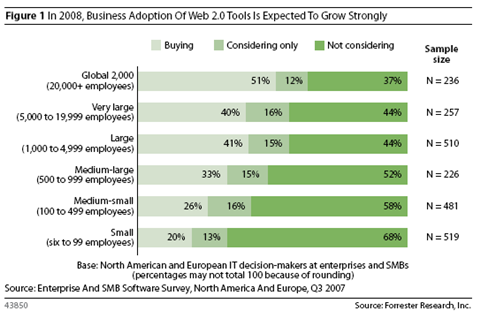Forrester: Social networking will be biggest enterprise 2.0 priority by 2013; Smaller businesses reticent

Enterprise 2.0 will become a $4.6 billion industry by 2013 and social networking tools will garner the bulk of the money, according to a report by Forrester Research.
The report, released on Monday and penned by Forrester analyst G. Oliver Young, shows a few notable trends that are worth diving into. Sarah Perez at ReadWriteWeb first detailed the report. Here are the charts that jumped out for me.
That chart is basically the opposite of what I would have expected. Enterprise 2.0 (all resources) should appeal more to small to medium sized businesses as it may lower implementation costs and provide other productivity enhancements. Instead more than half of these smaller businesses aren't even considering enterprise 2.0 apps while the giants are diving in head first.
Forrester defines Enterprise 2.0 as the corporate version of Web 2.0. Here's the research firm's definition:
In Forrester's view, the key hallmark of Web 2.0 is efficiency for end users, and the ultimate goal is to use technology like Ajax, rich Internet applications, blogs, wikis, and social networks to foster productive, advantageous behavior among employees, customers, partners, and other networks such as Social Computing, the Information Workplace, and collective intelligence.
Meanwhile social networking will be the biggest priority followed by mashups by 2013.
The top spending categories aren't all that surprising. For instance, social networking is a decent substitute for knowledge management applications, a category that companies haven't quite cracked. In other words, social networking could yield ROI. Mashups could also deliver faster time to market and it doesn't hurt that giants like IBM are pushing them.
Other key takeaways:
Web 2.0 tools and technologies focus on worker productivity and collaboration. Offerings like those from BEA Systems, IBM, and Microsoft and from pure-play vendors like Awareness, NewsGator Technologies, and Six Apart all factor into the enterprise Web 2.0 space.
Podcasting will the smallest enterprise 2.0 market with $273 million in projected spending by 2013.
Enterprise 2.0 apps will never see a blank IT slate: Legacy applications rule. Forrester writes:
Across the board, Web 2.0 tools enter a crowded space full of legacy software and processes that are difficult to displace and with which Web 2.0 software must integrate to be fully effective. Integration with lightweight applications like email and Excel, as well as heavier applications like Web content management suites, campaign management software, portal software, and customer relationship management (CRM) systems, must all be addressed over time.
Business units will drive enterprise 2.0 adoption. The IT department remains an obstacle due to slim budgets and the need to maintain legacy hardware and software infrastructure.
Enterprise 2.0 companies (right) will struggle to make deliver big profits. Why? Workers (and consumers) are used to free apps. "The starting point has been set at free, and buyers will always have the option to try to exploit a free consumer-class service to solve an enterprise problem if the entry price gets too high," says Forrester. If that scenario plays out you really have to wonder how enterprise 2.0 will generate $4.3 billion in spending by 2013.
